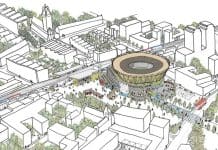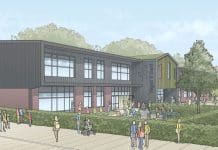Developer-led regeneration has “done very little” for the vast majority of Greater Manchester, according to a report by the Alliance Manchester Business School
Manchester faces a looming “growing crisis” as its housing and transport infrastructure fails to keep pace with expected job growth because of its “misguided” developer-led regeneration approach, according to an Alliance Manchester Business School report.
The creation of an estimated 110,000 new jobs by 2040 will put extra pressure on the city region’s transport network and mean rising demand for housing. Yet Manchester’s regeneration strategy over the past 30 years has focused excessively on new urban buildings, leaving the city with under-developed transport and social infrastructure such as housing, the authors of the ‘From developer regeneration to civic futures’ report argue.
It is estimated that an additional 68,000 trips per year will be made on Greater Manchester’s public transport by 2040. However, grants to the city’s bus network, which carries the most passengers, are being reduced.
Meanwhile, nearly 50,000 new mostly-private homes are planned in central Manchester by 2040 – yet some 80,000 people are currently on Greater Manchester’s social housing waiting list.
The study’s authors argue that private property developers, which have led Manchester’s renaissance, fail to consider the transport and social infrastructure – such as schools, libraries and broadband – that communities need to thrive.
The report calls for the Greater Manchester Combined Authority (GMCA) to create a long-term strategy that focuses on citizens with consideration given to the region’s cultural and geographical diversity.
Karel Williams, professor of accounting and political economy at Alliance Manchester Business School, who led the research team, said: “Nobody can argue that major progress has been made in regenerating Manchester’s city centre in the two decades since the IRA bomb, much to the city council’s credit.
“However, regeneration is about more than just new buildings in the centre of Manchester – it should benefit all communities in the wider city region too.
“The region now faces a growing crisis because while Manchester city centre is creating thousands of new jobs – many of them very well paid – transport and social infrastructure, such as housing in the outer areas, is failing communities and not delivering true regeneration. This is a direct result of the misguided approach of developer-led regeneration.”
The GMCA said its strategy had contributions from all 10 councils, the mayor, public services such as the NHS and fire service as well as help from the public.
“It sets out our ambitions for the future of the city-region and the 2.8 million people who live in the towns, cities, communities and neighbourhoods that make up Greater Manchester,” a spokesman said.
“It covers health, wellbeing, work and jobs, housing, transport, skills, training and economic growth.”
The report is authored by Karel Williams, Julie Froud, Andy McMeekin, Anne Stafford, Pam Stapleton and Hua Wei, all from Alliance Manchester Business School.














